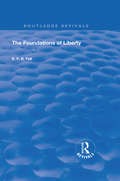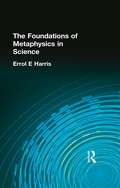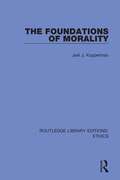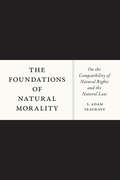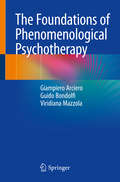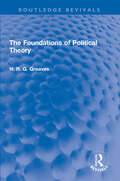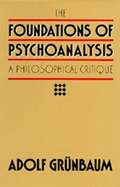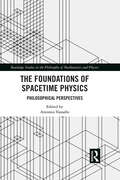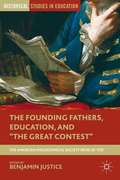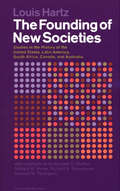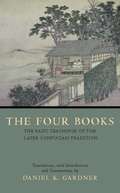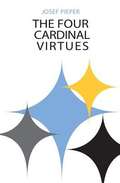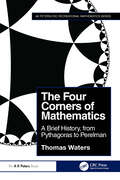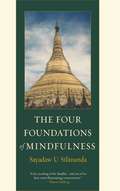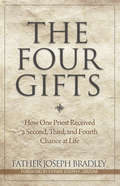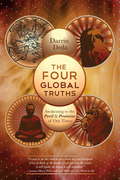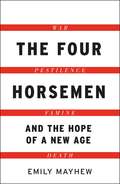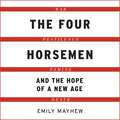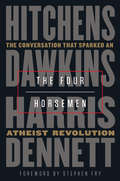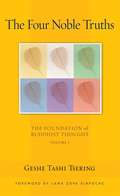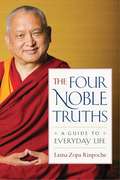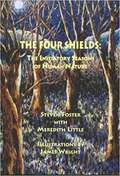- Table View
- List View
The Foundations of Liberty (Routledge Revivals)
by E. F. FellOriginally published in 1908, this book aims at setting forth liberty, personal and national - not as a mere utility as is usually the case - but as an a priori moral necessity, the sine qua non of all true civilisation.
The Foundations of Metaphysics in Science (Humanities Paperback Library)
by Harris, Errol EFirst published in 2002. Routledge is an imprint of Taylor & Francis, an informa company.
The Foundations of Morality
by Joel J. KuppermanOriginally published in 1983, this book maintains that the content and character of morality can be understood if it is regarded as a useful societal tool, whose central purposes include the prevention of harm and promotion of security for members of society. At the foundation is the general superiority of policies and attitudes that have good consequences. The book argues that ethics is ‘cognitive’ and explores the kinds of ethical knowledge and the ways in which ethical claims can be challenged and justified.
The Foundations of Natural Morality: On the Compatibility of Natural Rights and the Natural Law
by S. Adam SeagraveRecent years have seen a renaissance of interest in the relationship between natural law and natural rights. During this time, the concept of natural rights has served as a conceptual lightning rod, either strengthening or severing the bond between traditional natural law and contemporary human rights. Does the concept of natural rights have the natural law as its foundation or are the two ideas, as Leo Strauss argued, profoundly incompatible?With "The Foundations of Natural Morality, " S. Adam Seagrave addresses this controversy, offering an entirely new account of natural morality that compellingly unites the concepts of natural law and natural rights. Seagrave agrees with Strauss that the idea of natural rights is distinctly modern and does not derive from traditional natural law. Despite their historical distinctness, however, he argues that the two ideas are profoundly compatible and that the thought of John Locke and Thomas Aquinas provides the key to reconciling the two sides of this long-standing debate. In doing so, he lays out a coherent concept of natural morality that brings together thinkers from Plato and Aristotle to Hobbes and Locke, revealing the insights contained within these disparate accounts as well as their incompleteness when considered in isolation. Finally, he turns to an examination of contemporary issues, including health care, same-sex marriage, and the death penalty, showing how this new account of morality can open up a more fruitful debate.
The Foundations of Phenomenological Psychotherapy
by Giampiero Arciero Guido Bondolfi Viridiana MazzolaThis book addresses selected central questions in phenomenological psychology, a discipline that investigates the experience of self that emerges over the course of an individual’s life, while also outlining a new method, the formal indication, as a means of accessing personal experience while remaining faithful to its uniqueness. In phenomenological psychology, the psyche no longer refers to an isolated self that remains unchanged by life’s changing situations, but is rather a phenomenon (ipseity) which manifests itself and constantly takes form over the course of a person’s unique existence. Thus, the formal indication allows us to study the way in which ipseity relates to the world in different situations, in a way that holds different meanings for different people. Based on this new approach, phenomenological psychotherapy marks a transition from a mode of grasping the truth about oneself through reflection, to a mode of accessing the disclosure of self through a work of self-transformation (the care of self) that requires the person to actually change her position on herself.By putting forward this method, the authors shed new light on the dynamic interplay between a person’s historicity and uniqueness on the one hand, and the related physiopathological mechanisms on the other, providing evidence from the fields of genetics, cardiology, the neurosciences and psychiatry. The book will appeal to a broad readership, from psychiatrists, psychologist and psychotherapists, to researchers in these fields.
The Foundations of Political Theory (Routledge Revivals)
by H.R.G. GreavesFirst published in 1958, The Foundations of Political Theory strives to answer essential questions of politics by studying its foundations. In this book, Mr. Greaves treats the state as only one among several associations whose function is to promote entirely human ends. He tries to reinterpret such ideas as ‘self-realization’ and the ‘good life’ in ways acceptable to students of contemporary philosophy, who reject the theological and metaphysical doctrines these ideas have been tied to in the past. He insists that men get their moral standards and their ideas about what makes life worth living by reflecting on their experience; that there are no ultimate and self-evident moral principles. While admitting that moral standards are subjective in the sense that we cannot explain how men come to have them except by showing how they serve their needs, he refuses to allow that rational argument about them is therefore impossible. Since men are rational, since they have purposes and ideals and not merely desires, and since they know that to realize these purposes they must live with others, there are moral standards acceptable to all men when their function is understood.
The Foundations of Psychoanalysis: A Philosophical Critique
by Adolf GrunbaumThe book, a philosophical critique of the foundations of Sigmund Freud's psychoanalysis, offers a systematic analysis of Freud's theories, examines the effectiveness of the retrospective clinical methods used in psychoanalysis, and discusses free association, dreams, and personality.
The Foundations of Spacetime Physics: Philosophical Perspectives (Routledge Studies in the Philosophy of Mathematics and Physics)
by Antonio VassalloThis book provides an up-to-date overview of the foundations of spacetime physics. It features original essays written by world-class experts in the physics and philosophy of spacetime. The foundational questions regarding the origin and nature of spacetime are branching into new and exciting directions. These questions are not restricted to the quantum gravity program but also arise in the context of a well-established theory like general relativity. Against the background of these quick and diverse developments, this volume features a broad range of perspectives on spacetime. Part I focuses on the nature of spacetime in non-quantum theories, such as Newtonian mechanics and relativity. Part II explores some intriguing conceptual implications of developing a quantum theory of spacetime. The Foundations of Spacetime Physics is an essential resource for scholars and advanced students working in philosophy of physics, philosophy of science, and scientific metaphysics.
The Founders and the Idea of a National University
by George Thomas"This book examines the ideas of the Founders with regard to establishing a national university and what those ideas say about their understanding of America. It offers the first study on the idea of a national university and how the Founders understood it as an important feature in an educational system that would sustain the American experiment in democracy. Their ideas about education suggest that shaping the American mind is essential to the success of the Constitution and that this is something that future generations would need to continue to do"--"Constituting the American Mind is about early efforts to establish a national university and what those efforts say about the nature and logic of American Constitutionalism. This book offers the first in depth study of the efforts to establish a national university from a constitutional perspective. While mostly noted in passing, the national university was put forward by every president from Washington to John Quincy Adams as a necessary supplement to the formal institutions of government; it would help constitute the American mind in a manner that carried forward the ideas the constitution rested on including, for example, the separation of the "civic" from the "theological. ""--
The Founding Fathers, Education, and "The Great Contest"
by Benjamin JusticeWinner of the 2014 Critics Choice Book Award of the American Educational Studies Association How did the Founding Fathers and their generation think about public education? One place to look is the same place they did: American Philosophical Society Contest of 1795. Sponsored by the nation's premier research organization, the contest challenged writers to imagine a system of mass, public education suited to the 'genius' of America. In this book, leading historians team together to unpack the mystery and significance of the contest: the essays it produced, the men who wrote and reviewed them, and the broader landscape of ideas about nationhood, race, gender, religion, higher education and social reform of the early American republic. The book also includes two chapters on historical research methods and, for the first time ever in print, all seven of the original essays.
The Founding of Aesthetics in the German Enlightenment
by Stefanie BuchenauWhen, in 1735, Alexander Gottlieb Baumgarten added a new discipline to the philosophical system, he not only founded modern aesthetics but also contributed to shaping the modern concept of art or 'fine art'. In The Founding of Aesthetics in the German Enlightenment, Stefanie Buchenau offers a rich analysis and reconstruction of the origins of this new discipline in its wider context of German Enlightenment philosophy. Present-day scholars commonly regard Baumgarten's views as an imperfect prefiguration of Kantian and post-Kantian aesthetics, but Buchenau argues that Baumgarten defended a consistent and original project which must be viewed in the context of the modern debate on the art of invention. Her book offers new perspectives on Kantian aesthetics and beauty in art and science.
The Founding of New Societies: Studies in the History of the United States, Latin America, South Africa, Canada, and Australia
by Louis HartzThe pioneering political scientist presents his “fragment theory” of class, culture and ideology in post-colonial societies around the world.In his groundbreaking work, The Liberal Tradition in America, Louis Hartz demonstrated that beneath America’s history of political conflict was an enduring consensus around Lockean liberal principles. In The Founding of New Societies, Hartz continues his examination of ideology and national identity with a study of five societies established by European migration and colonization. The diverse political and cultural traditions of the United States, Latin America, South Africa, Canada, and Australia share little in common. Yet, as Hartz demonstrates, they each represent a cultural fragment of the European countries from which they sprang. Each new society retains the ideology that had been dominant at home at the time of their founding. Extraordinarily influential when it was first published in 1964, The Founding of New Societies is a classic work of political science. Hartz’s fragment theory continues to offer powerful insight into today’s political landscape.
The Four Books: The Basic Teachings of the Later Confucian Tradition
by Daniel K. GardnerIn this engaging volume, Daniel Gardner explains the way in which the Four Books--Great Learning, Analects, Mencius, and Maintaining Perfect Balance--have been read and understood by the Chinese since the twelfth century. Selected passages in translation are accompanied by Gardner's comments, which incorporate selections from the commentary and interpretation of the renowned Neo-Confucian thinker, Zhu Xi (1130-1200).This study provides an ideal introduction to the basic texts in the Confucian tradition from the twelfth through the twentieth centuries. It guides the reader through Zhu Xi's influential interpretation of the Four Books, showing how Zhu, through the genre of commentary, gave new coherence and meaning to these foundational texts. Since the Four Books with Zhu Xi's commentary served as the basic textbook for Chinese schooling and the civil service examinations for more than seven hundred years, this book illustrates as well the nature of the standard Chinese educational curriculum.
The Four Cardinal Virtues: Prudence, Justice, Fortitude, Temperance
by Josef PieperIn The Four Cardinal Virtues, Josef Pieper delivers a stimulating quartet of essays on the four cardinal virtues. He demonstrates the unsound overvaluation of moderation that has made contemporary morality a hollow convention and points out the true significance of the Christian virtues.
The Four Corners of Mathematics: A Brief History, from Pythagoras to Perelman (AK Peters/CRC Recreational Mathematics Series)
by Thomas WatersThe Four Corners of Mathematics: A Brief History, from Pythagoras to Perelman describes the historical development of the ‘big ideas’ in mathematics in an accessible and intuitive manner. In delivering this bird's-eye view of the history of mathematics, the author uses engaging diagrams and images to communicate complex concepts while also exploring the details of the main results and methods of high-level mathematics. As such, this book involves some equations and terminology, but the only assumption on the readers’ knowledge is A-level or high school mathematics.Features Divided into four parts, covering Geometry, Algebra, Calculus and Topology Presents high-level mathematics in a visual and accessible way with numerous examples and over 250 illustrations Includes several novel and intuitive proofs of big theorems, so even the nonexpert reader can appreciate them Sketches of the lives of important contributors, with an emphasis on often overlooked female mathematicians and those who had to struggle.
The Four Foundations of Mindfulness
by Sayadaw U Silanada Ruth-Inge Heinze Larry RosenbergAn absolute essential of Buddhist thought and practice. In addition to practitioners of Insight meditation, those who engage in other meditation forms such as dzogchen, mahamudra, and zazen will find that The Four Foundation of Mindfulness provides new means of understanding how to approach and deepen their own practices. The entire Great Discourse is included here, coupled with a beautifully clear commentary from the great scholar-yogi, Venerable U Silananda.
The Four Gifts
by Joseph BradleyBy all rights, Father Joseph Bradley should be dead. If past usage of beer, marijuana, and cocaine didn't do the trick, then certainly heart failure should have. Instead, by the grace of God, he is alive, clean, sober, and a functioning Catholic priest with another man's heart beating in his chest. But it came at a huge cost. While Joe was in his late teens, his father died suddenly. The loss was devastating and Joe's emotional desolation found escapist bliss in a beer bottle and cocaine vial, and he pledged irrevocable devotion to both. The slide into the abyss was ugly, and Joe finally sought help because there was nowhere else to go--which led him to serve others as a Catholic priest. The day of Joe's ordination, an old friend came to the mass and announced for all to hear, "Well, now I can say I've seen a miracle." Joe functioned for fifteen years as a sober priest before his heart gave out from the same heart disease that killed his father. But another miracle came his way, and he was blessed with a new heart--a gracious gift from a family during the most painful moment of their lives. Joe has been granted the blessing of four gifts: faith, sobriety, a new heart, and a fulfilling ministry. As Father Joe says, "Gratitude inspired this book. I owe it to people who helped rescue me from alcohol and drugs, and I owe it to my heart donor for giving me yet another chance at life."
The Four Global Truths
by Darrin DrdaWith the planet increasingly threatened with catastrophe and perhaps even collapse, many seekers are looking to past, proven models to create meaningful change in their lives. One such model is Buddhism's Four Noble Truths: the reality of suffering, the root cause of suffering, the end of suffering, and the path to the end of suffering. This fresh, timely book taps and modifies that ancient wisdom to address the pressing environmental and spiritual crises facing us. In The Four Global Truths, author Darrin Drda contends that as global temperatures rise and natural systems decline, humanity is forced to confront the destructiveness of unfettered material progress and mechanistic thinking. He posits a more enlightened worldview that honors the interdependence of all forms of life and aspects of reality, a concept increasingly see as a practical and compassionate approach to averting disaster. Writing in a warm, open style recalling that of Eckhart Tolle in The New Earth, Drda integrates elements of Western philosophy, transpersonal psychology, deep ecology, modern cosmology, and quantum physics to get at the heart of worldwide ecological suffering. In the process he encourages a responsible and joyful--and ultimately healing--participation in this critical moment in life.About the Imprint: EVOLVER EDITIONS promotes a new counterculture that recognizes humanity's visionary potential and takes tangible, pragmatic steps to realize it. EVOLVER EDITIONS explores the dynamics of personal, collective, and global change from a wide range of perspectives. EVOLVER EDITIONS is an imprint of North Atlantic Books and is produced in collaboration with Evolver, LLC.From the Trade Paperback edition.
The Four Horsemen
by Emily MayhewThe Four Horsemen - War, Pestilence, Famine and Death - first appeared in the Book of Revelations a thousand years ago, but they continue to track us in our own time. This original and inspiring study bycelebrated historian Emily Mayhew traces the advances in science, technology and humanitarianism that are enabling us to take them on, one by one.'The beauty of The Four Horsemen is how she takes her quaking readers to the edge of the abyss . . . I was left moved and uplifted . . . [A] first-class example of popular science' The Times'[A] thoughtful and ultimately uplifting analysis of the unsung heroes of our age' IndependentIt begins in Mosul, our oldest surviving city, and the extraordinary coalition created in a matter of days to save its people from the worst horrors of the liberation battle against ISIS. As the city and the humanitarian operation that helped it to survive are restructured for a new age, Mayhew shows other people whose work gives us hope for the future, from the search to find new ways to discover and use antimicrobial medicines and the innovations in preventing the spread of deadly viruses; the laboratory work being taken to protect crops from disease and reduce famine, and why the potato, not the banana is the future; to the unique courage and resolution of those dedicated to securing the rights of the dead and their families. Standing in the way of the Horsemen is what Emily Mayhew calls, 'the most extraordinary alliance ever to come together in defence of our humanity.' These are the doctors, scientists, statisticians, engineers, peace negotiators, pharmacists, historians, forensic scientists, vaccinators and volunteers who are creating solutions to life and death problems which threaten us all. They are the new heroes of our age and this book is about them.
The Four Horsemen
by Emily MayhewThe Four Horsemen - War, Pestilence, Famine and Death - first appeared in the Book of Revelations a thousand years ago, but they continue to track us in our own time. This original and inspiring study bycelebrated historian Emily Mayhew traces the advances in science, technology and humanitarianism that are enabling us to take them on, one by one.'The beauty of The Four Horsemen is how she takes her quaking readers to the edge of the abyss . . . I was left moved and uplifted . . . [A] first-class example of popular science' The Times'[A] thoughtful and ultimately uplifting analysis of the unsung heroes of our age' IndependentIt begins in Mosul, our oldest surviving city, and the extraordinary coalition created in a matter of days to save its people from the worst horrors of the liberation battle against ISIS. As the city and the humanitarian operation that helped it to survive are restructured for a new age, Mayhew shows other people whose work gives us hope for the future, from the search to find new ways to discover and use antimicrobial medicines and the innovations in preventing the spread of deadly viruses; the laboratory work being taken to protect crops from disease and reduce famine, and why the potato, not the banana is the future; to the unique courage and resolution of those dedicated to securing the rights of the dead and their families. Standing in the way of the Horsemen is what Emily Mayhew calls, 'the most extraordinary alliance ever to come together in defence of our humanity.' These are the doctors, scientists, statisticians, engineers, peace negotiators, pharmacists, historians, forensic scientists, vaccinators and volunteers who are creating solutions to life and death problems which threaten us all. They are the new heroes of our age and this book is about them.
The Four Horsemen
by Emily MayhewIn lucid and energised prose, Emily Mayhew summons the four horsemen of the apocalypse; the collective threat to humanity bearing the names of war, pestilence, famine and death. As they began in Revelations and have remained in human consciousness ever since, spanning time and space and evolving as new scientific discoveries and advancements in technology alter the world.(P)2021 Quercus Editions Limited
The Four Horsemen: The Conversation That Sparked an Atheist Revolution
by Richard Dawkins Sam Harris Christopher Hitchens Daniel DennettIn 2007, Christopher Hitchens, Richard Dawkins, Sam Harris, and Daniel Dennett filmed a landmark discussion about modern atheism. The video went viral. Now in print for the first time, the transcript of their conversation is illuminated by new essays from three of the original participants and an introduction by Stephen Fry. At the dawn of the new atheist movement, the thinkers who became known as “the four horsemen,” the heralds of religion's unraveling—Christopher Hitchens, Richard Dawkins, Sam Harris, and Daniel Dennett—sat down together over cocktails. What followed was a rigorous, pathbreaking, and enthralling exchange, which has been viewed millions of times since it was first posted on YouTube. This is intellectual inquiry at its best: exhilarating, funny, and unpredictable, sincere and probing, reminding us just how varied and colorful the threads of modern atheism are. Here is the transcript of that conversation, in print for the first time, augmented by material from the living participants: Dawkins, Harris, and Dennett. These new essays, introduced by Stephen Fry, mark the evolution of their thinking and highlight particularly resonant aspects of this epic exchange. Each man contends with the most fundamental questions of human existence while challenging the others to articulate their own stance on God and religion, cultural criticism, spirituality, debate with people of faith, and the components of a truly ethical life.Advance praise for The Four Horsemen “The full, electrifying transcript of the one and only conversation between the quartet of luminaries dubbed the ‘four horsemen’ of the New Atheism, which took place in Washington, D.C., in 2007. Among the vast range of ideas and questions they discuss: Is it ever possible to win a war of ideas? Is spirituality the preserve of the religious? And, are there any truths you would rather not know?”—The Bookseller (UK) (starred review) “If thinking were a sport, these four would be national superstars—and reading The Four Horsemen feels like having a front-row seat at the all-star game. This is more than a book about atheism and religion—it’s a lesson in how to use our intellect to cut through the haze of delusion and misconception inherent in any human society.”—Tim Urban, writer of Wait But Why?
The Four Noble Truths
by Lama Thubten Zopa Rinpoche Geshe Tashi Tsering Gordon McdougallThe four noble truths are well known as the Buddha's first and most essential explanation of his enlightened realizations. The truths diagnose the human existential crisis--suffering and its origin--and prescribe a solution--cessation and the path. To understand the four noble truths is to understand Buddhism as a whole. In The Four Noble Truths, Geshe Tashi draws on his decades of training in Tibetan Buddhism to illuminate these truths for a modern audience. His respectful engagement with Buddhists outside his own tradition and his insights into Western culture make this book refreshing. It will reward even those already acquainted with the fundamentals of Buddhism. The Four Noble Truths is the first of six stand-alone volumes in the Foundation of Buddhist Thought series.
The Four Noble Truths: A Guide to Everyday Life
by Lama Zopa RinpocheThe Buddha’s profound teachings on the four noble truths are illuminated by a Tibetan master simply and directly, so that readers gain an immediate and personal understanding of the causes and conditions that give rise to suffering as well as the spiritual life as the path to liberation. Experiential teachings on the Dharma by the Tibetan master Lama Zopa Rinpoche, written in a lively manner to inspire and motivate both general readers and experienced Buddhist practitioners to persist in understanding the nature or truth of suffering, its causes, and the remedies to secure the end of all suffering—the four noble truths of the path, the Buddha’s psychological method for us to break free from suffering. Speaks intimately and directly to the reader about how the principles of the four noble truths are to be applied to one’s day-to-day spiritual life as the path to liberation.
The Four Shields: The Initiatory Seasons of Human Nature
by Steven Foster Meredith LittleThe Four Shields: The Initiatory Seasons of Human Nature by Steven Foster and Meredith Little.
